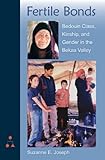Fertile Bonds : Bedouin Class, Kinship, and Gender in the Bekaa Valley.
Material type: TextPublisher: Gainesville : University Press of Florida, 2013Copyright date: ©2013Description: 1 online resource (247 pages)Content type: text Media type: computer Carrier type: online resourceISBN: 9780813048482Subject(s): Bedouins -- Lebanon -- Biqāʿ Valley | Biqāʿ Valley (Lebanon) -- Social life and customs | Families -- Lebanon -- Biqāʿ Valley | Fertility, Human -- Lebanon -- Biqāʿ Valley | Sex role -- Lebanon -- Biqāʿ ValleyGenre/Form: Electronic books.Additional physical formats: Print version:: Fertile Bonds : Bedouin Class, Kinship, and Gender in the Bekaa ValleyDDC classification: 304.6089/927205692 LOC classification: DS80.55.B43.J67 201Online resources: Click to View
TextPublisher: Gainesville : University Press of Florida, 2013Copyright date: ©2013Description: 1 online resource (247 pages)Content type: text Media type: computer Carrier type: online resourceISBN: 9780813048482Subject(s): Bedouins -- Lebanon -- Biqāʿ Valley | Biqāʿ Valley (Lebanon) -- Social life and customs | Families -- Lebanon -- Biqāʿ Valley | Fertility, Human -- Lebanon -- Biqāʿ Valley | Sex role -- Lebanon -- Biqāʿ ValleyGenre/Form: Electronic books.Additional physical formats: Print version:: Fertile Bonds : Bedouin Class, Kinship, and Gender in the Bekaa ValleyDDC classification: 304.6089/927205692 LOC classification: DS80.55.B43.J67 201Online resources: Click to View Cover -- Fertile Bonds -- Title -- Copyright -- Contents -- List of Figures -- List of Tables -- Acknowledgments -- Note on Transliteration -- 1. Introduction and Overview -- 2. Nomadic Lives in Transition -- 3. (Un)Stratified Reproduction: Class, Tribe, and Culture -- 4. Gender Myths and Demographic Realities -- 5. Marriage between Kin -- 6. Population and Poverty: A Capitalist Trap? -- 7. Class Differentiation of Demographic Regimes -- 8. Demography on the Nomadic Periphery -- 9. Conclusions -- Notes -- Bibliography -- Index.
With an average of over nine children per family, older cohorts of Bedouin in the Bekaa Valley of Lebanon have one of the highest fertility rates in the world. Many married couples in this pastoral community are close relatives--a socially advantageous practice that reflects the deep value Bedouins place on kinship. To outsiders, such family norms can seem disturbing, even premodern. They attract assumptions of Arab "backwardness," poverty, and sexism. Astoundingly, however, Fertile Bonds flips these stereotypes. Anthropological demographer Suzanne Joseph shows that in this particular group, prolific birth rates coincide with moderate death rates and high levels of nutrition. Despite differences in gender, class, and occupation, members of Bekaa Bedouin society rely heavily on kinship ties, sharing, and reciprocity, and experience a high degree of social and demographic equality. This story, unfamiliar to many, is one that is fading as traditional nomadic livelihoods give way to encapsulation within the state. With the help of this surprising, nuanced study--one of the first of its kind in the Middle East--knowledge of such marginalized pastoral groups will not vanish with the disappearance of their way of life. Joseph's book expands our understanding of peoples far removed from consolidated government control and provides a broad analytical lens through which to examine demographic divides across the globe.
Description based on publisher supplied metadata and other sources.
Electronic reproduction. Ann Arbor, Michigan : ProQuest Ebook Central, 2018. Available via World Wide Web. Access may be limited to ProQuest Ebook Central affiliated libraries.

There are no comments on this title.